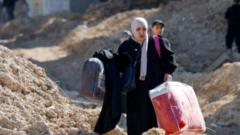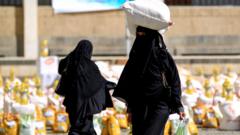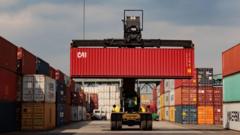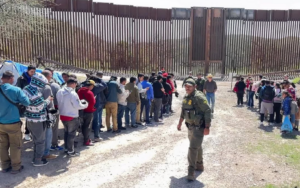Former workers liberated from notorious scam compounds along the Thai-Myanmar border are now trapped in makeshift camps, grappling with poor living conditions and fear of repercussions.
Stranded and in Despair: Freed Victims of Myanmar's Scam Centres Seek Help

Stranded and in Despair: Freed Victims of Myanmar's Scam Centres Seek Help
Thousands of victims freed from Myanmar's scam operations find themselves in precarious conditions, facing uncertainty about their future.
The plight of these individuals, who were deceived into grueling labor under harsh conditions, highlights the complexities of international response and humanitarian aid in the face of transnational crime and regional instability.
In an emotional appeal, an Ethiopian man known as Mike recounted his ordeal after being trapped for a year within a brutal scam operation just across the Thai border. As one of around 7,000 people recently liberated from exploitative scam centres, Mike described the dire conditions of makeshift camps, where he shares overcrowded quarters with hundreds of others. The former workers are in desperate need of assistance, highlighting the challenges faced in international humanitarian efforts as the victims await repatriation.
Following increased pressure from China on Thailand, the Thai government limited telecommunications and banking access to the scam operations, allowing for the release of workers. However, with victims being held in unsanitary conditions, progress in their evacuation to Thailand has been painfully slow. Reports indicate that many of the liberated individuals suffer from health issues and lack adequate access to food and sanitation, exacerbating their trauma and distress.
Mike's narrative reflects the harrowing experiences of numerous others, where promises of employment transformed into nightmares of exploitation and abuse. He detailed the physical violence endured under coercive conditions, bringing light to the brutal tactics employed by the perpetrators to meet fraudulent targets.
Despite some countries, like China, attempting to shut down these operations, many scams persist due to the high poverty and desperation in other regions that make individuals susceptible to deceitful offers. Former workers reported the deplorable state of the camps, overwhelmed by a lack of resources, with many suffering health complications such as tuberculosis.
Moreover, numerous complications arise due to the diverse nationalities of the victimplants trapped in this humanitarian crisis. With some being citizens of nations lacking proper diplomatic representation in Thailand, the situation is being complicated by logistical and bureaucratic challenges in organizing their return.
Although the Thai government has expressed intentions to expedite evacuations, officials must navigate the critical balance of repatriating genuine victims of trafficking while also preventing individuals involved in criminal activities from reentering society. As of now, many victims, including Mike, await uncertain fates as concerns grow over potential handing back to previous perpetrators if the current situation does not improve.
The urgency of this crisis is reflected in humanitarian calls for aid, with organizations seeking to raise awareness and push for a more rapid response in aiding the victims and preventing further exploitation in the region. As the situation unfolds, the plight of thousands of victims emphasizes the pressing need for a coordinated international response to combat human trafficking and provide necessary support for those seeking to escape their torturous circumstances.
In an emotional appeal, an Ethiopian man known as Mike recounted his ordeal after being trapped for a year within a brutal scam operation just across the Thai border. As one of around 7,000 people recently liberated from exploitative scam centres, Mike described the dire conditions of makeshift camps, where he shares overcrowded quarters with hundreds of others. The former workers are in desperate need of assistance, highlighting the challenges faced in international humanitarian efforts as the victims await repatriation.
Following increased pressure from China on Thailand, the Thai government limited telecommunications and banking access to the scam operations, allowing for the release of workers. However, with victims being held in unsanitary conditions, progress in their evacuation to Thailand has been painfully slow. Reports indicate that many of the liberated individuals suffer from health issues and lack adequate access to food and sanitation, exacerbating their trauma and distress.
Mike's narrative reflects the harrowing experiences of numerous others, where promises of employment transformed into nightmares of exploitation and abuse. He detailed the physical violence endured under coercive conditions, bringing light to the brutal tactics employed by the perpetrators to meet fraudulent targets.
Despite some countries, like China, attempting to shut down these operations, many scams persist due to the high poverty and desperation in other regions that make individuals susceptible to deceitful offers. Former workers reported the deplorable state of the camps, overwhelmed by a lack of resources, with many suffering health complications such as tuberculosis.
Moreover, numerous complications arise due to the diverse nationalities of the victimplants trapped in this humanitarian crisis. With some being citizens of nations lacking proper diplomatic representation in Thailand, the situation is being complicated by logistical and bureaucratic challenges in organizing their return.
Although the Thai government has expressed intentions to expedite evacuations, officials must navigate the critical balance of repatriating genuine victims of trafficking while also preventing individuals involved in criminal activities from reentering society. As of now, many victims, including Mike, await uncertain fates as concerns grow over potential handing back to previous perpetrators if the current situation does not improve.
The urgency of this crisis is reflected in humanitarian calls for aid, with organizations seeking to raise awareness and push for a more rapid response in aiding the victims and preventing further exploitation in the region. As the situation unfolds, the plight of thousands of victims emphasizes the pressing need for a coordinated international response to combat human trafficking and provide necessary support for those seeking to escape their torturous circumstances.

















